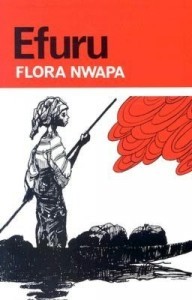Nigerian Literature – Cries of Protest

Nigerian literature often expresses the struggles of a nation that has survived the exploitation of colonialism and capitalism as well as the devastation of civil war and authoritarianism. Given the turmoil in Nigerian history, it is inevitable that the postcolonial Nigerian artist would fulfill the traditional role of artist as the voice of the people. The manifestation of protest in the novels, plays, and poetry of Nigerian authors in the last 40 years attests to the role of the artists as the cry of protest.
The publication of Flora Nwapa’s Efuru in 1966 was a watershed moment for African women writers. Although these writers may not claim the label of feminism, their works offer realistic pictures of gender issues in a patriarchal society and expose a society formed in a history of colonialism and patriarchy.
Biography
Florence Nwanzuruahu Nkiru Nwapa was born January 18, 1931 in Oguta, East Central State, Nigeria. She obtained a Bachelor of Arts degree from University College, Ibadan in 1957, and a Diploma in Education from University of Edinburgh the following year. Upon her return to Nigeria, she joined the Ministry of Education in Clabar as an Education Officer until 1959. She then accepted a teaching position at Queen’s School in Enugu, where she taught English and Geography from 1969-71. She continued to work in both education and civil service in several positions, including: Assistant Registrar, University of Lagos (1962-1976), Minister of Health and Social Welfare, East Central State (1970-71), and Minister of Lands, Survey and Urban Development (1971-74).
Flora Nwapa began her career as an author with the publication of Efuru in 1966. Nwapa is often credited with being the first African woman to publish in English (although some controversy exists around this claim). She followed with her second novel, Idu, in 1971. After the publication of these two novels, Nwapa became unsatisfied with the publicity and distribution efforts by her publisher, Heinemann Educational. In 1974, she founded Tana Press, Ltd and in 1977, Flora Nwapa Books. She published the rest of her works, as well as many other works from other writers, through one of her two publishing companies.
Nwapa continued her career as an educator throughout her life, teaching at colleges and universities around the world, including among others, New York University, Trinity College, University of Minnesota, University of Michigan, and University of Ilorin.
Flora Nwapa died at the age of 62 in 1993.
Major Publications
Novels
- Nwapa, Flora. Efuru. London: Heinemann, 1976.
- —. Idu. London: Heinemann Educational, 1978.
- —. Never Again. Enugu, Nigeria: Tana Press, 1986.
- —. One is Enough. Enugu, Nigeria: Tana Press, 1984.
Short Stories and Poetry
- Nwapa, Flora. Cassava Song and Rice Song. Enugu, Nigeria: Tana Press, 1986
- —. This is Lagos and Other Stories. Enugu, Nigeria: Nwankwo-Ifejika & Co., 1971
- —. Wives at War and Other Stories. Enugu, Nigeria: Tana Press, 1984
Feminist themes
Although Nwapa repeatedly denied being a feminist, many of her works do address questions of tradition and transformation for women. Nwapa weaves together traditional Igbo mores and myths and contemporary dilemmas to create complex characters struggling for independence in their societies. She shows women succeeding outside of the traditional woman’s role of mother and wife, while also reaffirming Igbo culture. (See Gender and Nation)
In an interview with Contemporary Authors, Nwapa commented, “I have been writing for nearly thirty years. My interest has been on both the rural and the urban woman in her quest for survival in a fast-changing world dominated by men.”
Bibliography
- Adeola, James, editor. In Their Own Voices, African Women Writers Talk. Portsmouth, NH: Heinemann, 1990.
- Andrade, Susan Z. “Rewriting History, Motherhood and Rebellion.” Research in African Literatures 21. (1990): 91-110.
- Ezeigbo, Theodora Akachi. “Traditional Women’s Institutions in Igbo Society: Implications for the Igbo Female Writer.” African Languages and Cultures 3. (1990): 149-65.
- Ikonne, Chidi. “The Society and Woman’s Quest for Selfhood in Flora Nwapa’s Early Novels.” Kunapipi 6. (1984): 68-78.
- Ogunyemi, Chikwenye Okonjo. Africa Wo/Man Palava. Chicago: University of Chicago Press, 1996.
- Wilentz, Gay. Binding Cultures, Black Women Writers in Africa and the Diaspora. Bloomington: Indiana University Press, 1992.
(Biographical information obtained from Contemporary Authors, Gale Research, 1996)
Author: Susan Leisure, Fall 1996
Last edited: May 2017